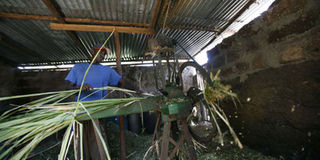Brookside training to boost milk supply

A farm worker preparing Napier grass for the dairy cows in Kangemi, Nairobi. PHOTO | EVANS HABIL | NMG
What you need to know:
- The industry is largely dependent on rainfall and the drought witnessed at the beginning of the year left both the producer and consumer worse off.
- Brookside Dairy, the country’s largest processor, has set up demonstration farms where farmers are trained on how to sustain milk production even during the dry seasons through investment in feed preservation.
- Industry players believe investment in animal feed preparation and conservation is key in ensuring year-round supplies of raw milk, hence stability in consumer prices.
Dairy processors are leaving nothing to chance as they strategise on how to maintain raw milk supplies from farmers coming shortly after a near debilitating dry spell.
The industry is largely dependent on rainfall and the drought witnessed at the beginning of the year left both the producer and consumer worse off.
Earlier in the year, processors reported a 50 per cent drop in intakes, attributed to biting drought.
Industry players believe investment in animal feed preparation and conservation is key in ensuring year-round supplies of raw milk, hence stability in consumer prices.
Brookside Dairy, the country’s largest processor, has set up demonstration farms where farmers are trained on how to sustain milk production even during the dry seasons through investment in feed preservation.
“We have set up demo farms where farmers benefit from training from their peers on how to prepare animal feed. We demonstrate how feed, such as hay, can be conserved for use during periods of depressed rainfall,” Mr John Gethi, Brookside’s director of milk procurement, said.
In Nakuru County, the processor has set up a demo farm in Rongai, where it sponsors training for farmers every Friday.
“The demo farms complement our dairy training courses, which are also held on a weekly basis. We felt it was futile asking farmers to grow milk production without demonstrating to them how to go about it,” said Mr Gethi.
Raw milk sales
Last year, farmers in Nakuru County earned Sh610 million from raw milk sales to the processor, which reflected a 10 per cent growth over earnings in 2015.
Mr Gethi attributed the increase in income to rising production following a sustained campaign to have their contracted farmers adopt modern breed management methods.
“The increase in earnings last year for Nakuru farmers last year shows that our dairy training courses had an impact on production volumes. We intend to increase the number of courses so that as many dairy farmers as possible benefit from increased knowledge in animal husbandry,” Mr Gethi said.
“We want to work with all stakeholders, including the county leadership, to transform dairy into a viable commercial enterprise for our farmers,” he told the Smart Company.
The Brookside official asked farmers to embrace record keeping as one way of monitoring optimum performance of their farms. He said they were a must, regardless of the size of the individual farm.
“We are currently emphasising records as a critical tool to monitoring progress of dairy farms.
"This is one area where we want to train all our 160,000 farmers countrywide, so that they are able to tell whether they are breaking even in the dairy undertaking or not,” added Mr Gethi.





